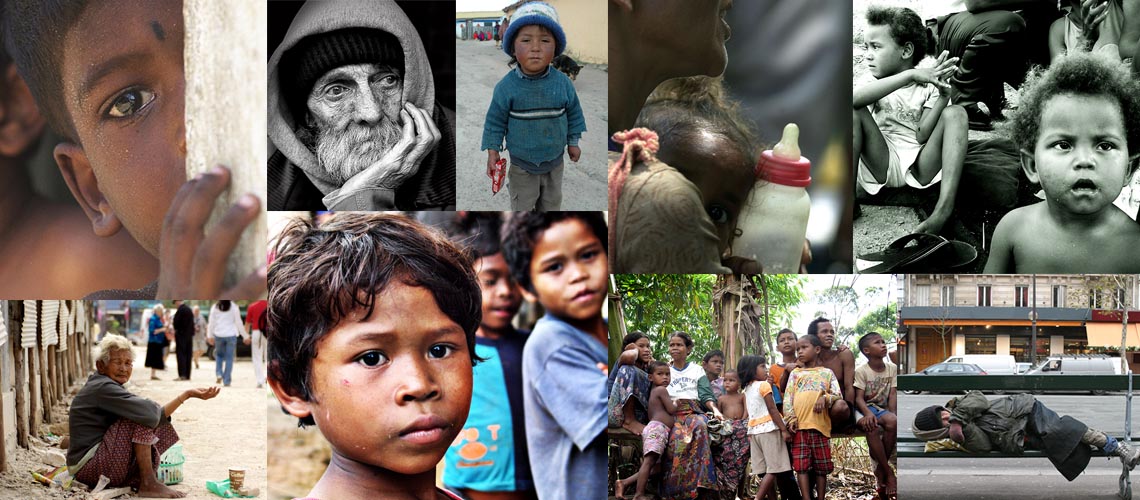La pobreza como sabemos es un tema muy extenso y complejo que no se puede abordar en dos líneas. No trato de darte números o estadísticas, pero quiero que tengas conciencia y te des cuenta que hay muchas personas que mueren de hambre cada día y es insólito ver, que por más que los países cambien de gobiernos, este fenómeno va incrementando cada día mas y mas.
Es muy triste ver esos niños deambular por las calles en busca de comida o madres que no tienen más que sus pechos para alimentar a sus bebes. Alguna vez te has preguntado: ¿qué futuro les espera a estos niños o estas familias? En nuestras manos esta hacer la diferencia y ayudar a cambiar este mundo.
Hablar de pobreza en Latinoamérica, es hablar de niños comiendo basura, de familias que sobreviven con cincuenta dólares al mes o menos, de personas que viven en casas de cartón. Es hablar de personas marginadas por una sociedad o gobiernos egoístas que se hacen ajenos ante esta problemática.
Es muy común cuando visitas países latinoamericanos ver a niños de cinco años trabajando en las calles, vendiendo dulces o pidiendo dinero para poder comer. En una de mis visitas a un país centroamericano me toco ver a una familia buscando comida en un basurero. Es tan triste ver escenas como estas y palpar la realidad de lo difícil que la vida es para estas personas. Más triste aun, es ver de cómo los que gobiernan estos países no hacen nada por cambiar la vida de estas personas. Lo que estos hacen es robar fondos o donaciones que van dirigidos a instituciones encargadas de velar por el bienestar de estas personas, sin importarles que dejan sin comer a su pueblo.
Yo comprendo que pobreza siempre habrá y es difícil de erradicar, pero no es posible que exista ese contrástate tan abismal entre riqueza y pobreza. Una pobreza extrema.
|
Roberto Fernandez Point of View:
|
||
|
I certainly appreciate people writing and discussing this important issue. I hope that the opinions I am about to express to you make sense and that you are not offended in any way. That is not my intention.
To tell you a bit about myself, I was also born in ES and was brought to the US as a child. I graduated school here and have had the honor to have a good life and good opportunities that would have been hard to attain in ES. I never forget where I come from and the realities of our country, in the past and in the present.
I also had the privilege to serve in the US Peace Corps, working as an Education and Economic Development volunteer in the Island shared by the Dominican Republic and Haiti. Poverty is something I have witnessed and experienced both in my work and in my travels. This is why this issue is important to me.
So this is what I agree with about what your wrote. So I will share it with you:
Needless to say we both agree that poverty is everywhere, even here in the US. We are also in agreement that most of the time and to your point, governments tend to look the other way when poverty affects the majority of people. The only times poverty takes on a central role in mainstream media, especially here in the US, is when the status-quo is challenged by the masses, or people who are repressed. (Examples of this are the coup d’etats in recent times, Aristide in Haiti, Zelaya in Honduras, Chavez in Venezuela and so on)
While these governments certainly were not perfect, they had begun to challenge the powerful 1%. And when that authority or well being is challenged then we have interventions, usually involving the US, but not always. It is fact that the governments in most Latin American countries, do in fact cater or bend over backwards to attract foreign investment that usually benefit themselves or their investors. It is the case with DR-CAFTA, NAFTA, and now the proposed Trans-Pacific Partnership (TPP). You may or may not know that these “aid” initiatives do little or almost nothing to help the people that they say they are aiming to help. To give you an example of this, you don’t have to go far: look at the “maquilas” or “monsanto” projects that USAID sets up in poverty stricken countries, cheap labor, low pay for workers, result in bigger profit margins for the corporations. (Again, examples in DR, Honduras, Haiti, El Salvador).
Now, to my criticism of your piece. I think it is important to talk about how one frames something. I’ve learned through my experience in working in Latin america is that you may have the best intentions of helping, but if the framework of which you set your work to, isn’t properly thought of, then failure is mostly likely imminent.I think that we as a society must think of this issue as something that affects and effects us all. I think your framework is incorrectly assessed. You mention: On one of my visits to a Central American country I got to see a family looking for food in a dumpster. It is so sad to see scenes how are you and feel the reality of how difficult life is for these people. Sadder still, is to see how those who govern these countries do nothing to change the lives of these people. What these do is steal funds or grants that are aimed at institutions responsible for the welfare of these people, no matter who leave without eating his people.
When you use “these people” you make it sound as though you are looking at the problem from a macros point of view. When we make the issue “ours”, then it is only natural for us to look for solutions, or to denounce “our” governments of their short comings. We must all demand. We must all care. We must all act. We must all work for the benefits of others. And this I know is your point. But to your audience, in my opinion you are not empowering enough to make the poverty issue in Latin America or the world, a problem that we all own. It is safe to say we are not in the 1%, so then we must acknowledge that because we are here or we are living comfortably we cannot fight so that others have the same access. In most cases, our families fled Central america and continue to do so, because of poverty and violence. But it’s our issue, not just for these people and these governments.
|
||


Me parece muy bonito tema y hay que tener en cuenta que juntos podemos cambiar muchas cosas en este mundoo enpezando por este tema de la pobreza
Yo opino que la pobresa no se mitiga poniendo los niños a trabajar deberian tansiquiera estudiar un turno y trabajar el otro hasi puede yegar haser un profecional y por ende tener un trabajo mejor que lo saquaria de la pobresa
me parece bueno el tema por que a si nosotros nos damos cuenta de los problemas de nuestra sociedad y que en la actualidad nosotros con nuestro esfuerzo podemos cambiar esta realidad de la pobreza
Gracias amigos por participar!
Gracias por los temas muy importantes
Les agradeceremos mucho si pueden compartir este tema o cualquier otro que les haya interesado con todas sus amistades. También aceptamos sugerencias de temas a tratar!
The largest issue we have with battling economic inequality is there is no way to change it. We can take steps to make the public aware of the poverty in South America. We can raise awareness of the growing separation between the elite 1%, and the remainder.
The problem is that being aware doesn’t mean there are ways to make the changes needed. The changes needed to be made are changes that have to be sustainable. Everyone on earth can be aware. Everyone can own it, and do absolutely nothing to make a lasting change. It is time to stop with platitudes, and begin suggesting solutions
I will go first.
What about instituting salary caps for large corporate employees? Say the top salary can not exceed a certain percentage higher than the lowest salary offered by that corporation.
Let’s hear some solutions.